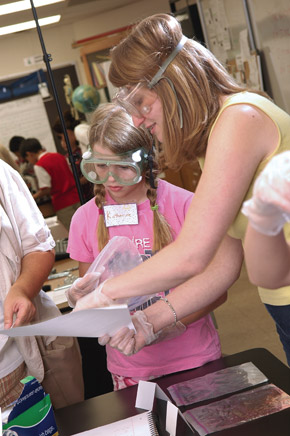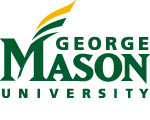Building a Mystery
Teachers and campers share learning in hands-on summer science program
By Colleen Kearney Rich, MFA ’95
When you are in fifth grade, it isn’t often that someone asks you for advice. But that’s exactly what youngsters were asked to provide in the science camps offered by the Center for Restructuring Education in Science and Technology (CREST).
Each summer since 1997, CREST has held day camps that offer hands-on laboratory and field experience to rising fifth, sixth, and seventh graders. Last summer’s offerings were two-week camps called Dig It! Adventures in Archaeology and Crime Solvers.
But the campers weren’t the only students present. The camps were taught by a team of graduate students enrolled in Science Methods for the Elementary Classroom, a College of Education and Human Development summer course.

Lauren Hansen with campers Andrew Han Kim and Cyrus Ulrich
Inquiry-Based Learning
Both camp sessions began with a question. “They have one question that they have to tackle, a question and a scenario,” says CREST director Donna Sterling. “We’ve tried to find things that would be interesting to children and that are here [on campus].”
The hypothetical question facing campers in Dig It! had to do with bones and pottery fragments found on a university residence hall construction site. The group was asked to advise developers on whether they should halt building—and possibly leave incoming students without a place to stay—to excavate the site.
Crime Solvers campers worked as forensic scientists to analyze crime scene evidence from a mock burglary of a professor’s office on campus. “We try to keep the scenario Mason-centric, so the children feel that they are really in the midst of an urgent problem needing their solution here on campus,” says Wendy Frazier, assistant professor of science education, who has directed the camps since 2005.
In each case, the investigations were broken down into lessons, so that the campers acquired the skills and knowledge to collect evidence and come up with recommendations or solve the crime.

Sarah Deshong with camper Katherine Milazzo
Teaching Teachers
The graduate students in the Frazier’s Science Methods course were divided into teams for each camp. As part of the course requirements, each team developed the scenario and curriculum for its camp and took turns teaching the components. For some of the future teachers, it was their first time actually working with students.
“It is a fantastic experience for them,” says Sterling, who founded the camps and continues to serve as a resource. “After every session, we sit down with the teachers and talk about what worked and what didn’t, and then we adjust the plans for [the next day].”
Many of the future teachers found that even with the best lesson plan, it isn’t going to do much good if you can’t hold the students’ attention. “For many of them, there is a real paradigm shift,” says Sterling. “Classroom management is a big part of teaching.”
Sara Deshong, who is working on an MEd, was glad to have the experience. “I was really worried,” she says. “I had not had a lot of exposure to older kids.”
Deshong and classmate Lauren Hansen were the first to teach at the Crime Solvers camp. Over two days, they taught the 27 campers about DNA and how to analyze DNA using gel electrophoresis. Deshong was pleased with the results.
“I know they learned something,” Deshong says, indicating posters created by the campers, which reflect a number of the concepts from the pair’s presentations.
Sarah Saladini was also delighted to have the opportunity to teach. “This is the best learning experience I’ve had so far,” says Saladini, who is also working on an MEd. “We plan lessons all the time for our courses, but we never get to teach them.”
A Win-Win Program
According to Sterling, the CREST camps have a following and fill up quickly. Many campers return in subsequent years and often bring their siblings. Because of its popularity, CREST doesn’t need to do a lot of marketing. Information is passed along to families mainly through teachers in the local public school systems.
“I’m probably going to be a scientist, so this really helped me,” says Cristen Centra, a fifth grader at Hayfield Elementary School in Alexandria, Virginia, who attended both sessions with her brother, Zack. Her favorite part was the archaeology dig and reconstructing a pot from the fragments found.
Opportunities Unlimited
Each summer, Mason is home to a large number of camps, ranging from academic to artistic to athletic. Check out summercamps.gmu.edu for specifics.
Brittany Patterson, a seventh grader at Frost Middle School in Fairfax, Virginia, came to the Crime Solvers camp at the urging of an older cousin. “She is studying this kind of stuff at college, and she thought I would find it interesting. It has been a lot of fun.”
For Nicholas Lellock, a seventh grader at Rocky Run Middle School in Chantilly, Virginia, solving crimes is a possible career. He thought he had the camp crime solved by the end of the first week.
“I found out things looking at all the data,” he says, but his favorite part was the field work. “I really liked the bagging and the tagging, and then testing the stuff.”
“I am so proud of the future teachers,” says Frazier. “I can say with confidence that each of them has grown as educators through this experience. Their efforts helped increase the [campers’] science knowledge, as well as their excitement and enthusiasm for learning.”

